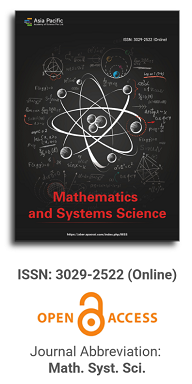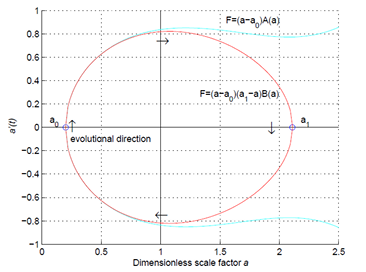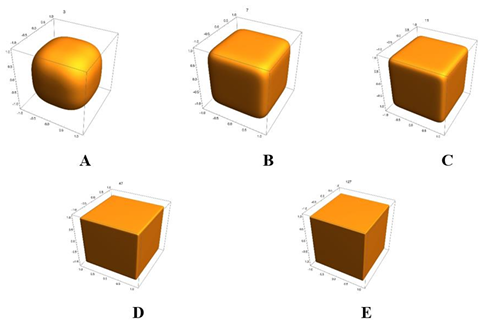


Full Issue
| View or download the full issue |
Issue release: 30 June 2025
Issue release: 30 June 2025
Issue release: 30 June 2025
This research explores the impact of the relative magnetic effect on the Couette flow of dusty Casson fluid between two parallel Riga plates. The mathematical model is based on a set of partial differential equations that describe the behavior of the dusty Casson fluid in interaction with the Riga plate. To convert this system of equations to its dimensionless form, appropriate transformations are used, and to solve this system numerically, explicit finite difference methods are applied to it. A graphical representation has been presented by using MatLab software for a comprehensive understanding of the effect of various non-dimensional parameters such as pressure gradient parameter (α), Casson parameter (β), modified Hartmann number (Ha), fluid concentration parameter (R), particle mass parameter (G), Eckert number (Ec), Prandtl number (Pr), and temperature relaxation time parameter (L0) on the velocity distributions u (or up) and on the temperature distributions θ (or θp), including shear stress and Nusselt number for both clean and dust fluid particles. The impacts of these parameters on the above-mentioned distributions have been discussed with their physical significance, taking the variation of any one of those parameters and with fixed values of α =1, β = 2, Ha=1, R = 0.5, G = 0.5, Ec = 0.01, Pr = 0.71, and L0 =0.8. The results reveal significant effects of relative magnetic fields on both clean fluid and dust particle motion.
Issue release: 30 June 2025
Issue release: 30 June 2025
In this paper, we continue using the theoretical model describing 3D-branching systems that is applied to describe the living system, such as the silkworm butterfly cocoons (Bombyx mori). The proposed fitting function that follows from the applied model allows us to describe completely with high accuracy (the fitting error is less than 0.1%) the whole stage of the temporal evolution of the silkworm cocoons in room conditions (during 13 days of the experiment the lowest temperature noted was 27 ℃ and the highest temperature was 29 ℃) and with relative humidity located in the interval [Hmin 54% £ H £ 76% Hmax] during 13 days (13 November 2023 to 25 November 2023) of the impedance measurements. The selection of this biological object is related to the fact that all possible conducting channels formed inside the given cocoon have 3D structures. Analysis of the measured impedance data shows that the measurements at the beginning of each day have a monotone character, while each measurement after the first measurement of each day has chaotic behavior. It means that during the night a cocoon “has a rest”. After this resting period, the applied voltage disturbs internal processes that are reflected in the behavior of the measured impedance. It has an oscillating character. These oscillations reflect the “regrouping” of conducting channels that take place inside the measured cocoon.
Issue release: 30 June 2025
Research objective: to prove the feasibility of forming a problem-oriented array under complex conditions of uncertainty by using different options for modeling decision-making and selecting the optimal model. Formation, description, and intellectual analysis of a complex data set, which is an example of a problem-oriented library-museum-archival-information array on nobelistics, are carried out under conditions of uncertainty due to the ambiguity of attribution of each element to this array. The possibility of modeling decision-making in these conditions is shown, the best of which is the optimal formation, description, and intellectual analysis of a complex array of problem-oriented data. A typical information situation is used for modeling when the decision-making body has knowledge of the a priori probability distribution on the state elements of the data array. For each of the seven variants of information situations, a set of criteria for making optimal decisions is selected; each criterion is mathematically described. The real functioning subject-oriented library-museum-archive-information data array on nobelistics of the International Nobel Information Center, consisting of the Nobel Scientific Library, the Museum of the Nobel Family and Nobel Prize Laureates, the Archive of the Nobel Family and Nobel Prize Laureates, and electronic databases on nobelistics, was used.
Issue release: 30 June 2025
Variability characterization is a key component in the reliability assessment of geotechnical systems, particularly in scenarios involving tailings deposits, where spatial heterogeneity can critically impact design safety. Despite advances in modeling spatial randomness, many reported cases still rely on theoretical assumptions to define appropriate statistical characterizations—such as theoretical probability density functions (PDFs) and correlation structures—which may misrepresent site-specific conditions. To bridge this gap, piezocone penetration tests (CPTu) stand out as promising tools for providing continuous measurements along a vertical profile that can be used to define statistical behavior and avoid bias. This paper presents a spatial variability characterization of a bauxite tailings deposit based on mechanical parameters derived from CPTu data. The study includes basic statistical analysis—mean (μ), standard deviation (s), coefficient of variation (CV)—alongside a comparison with theoretical PDFs. Subsequently, spatial correlation is evaluated through covariance analysis and estimation of the vertical scale of fluctuation (δ), using a dedicated subroutine that fits theoretical autocorrelation models (TAMs). The deposit is classified as highly variable according to the IcRW index. The normal and Weibull PDFs best represent the data distributions. The vertical scales of fluctuation vary significantly: 0.01 m to 4.43 m for cone resistance (qc), 0.01 m to 4.36 m for sleeve friction (fs), and 0.01 m to 5.00 m for pore water pressure (u2). These findings offer valuable input for probabilistic stability and serviceability analyses, contributing to safer and more informed geotechnical designs involving mine tailings.
Issue release: 30 June 2025
Enumeration of plane trees and noncrossing trees was recently unified by considering d-dimensional plane trees in which ordinary plane trees are 1-dimensional plane trees and noncrossing trees are 2-dimensional plane trees. Also, recently variants of k-plane trees and k-noncrossing trees were introduced and enumerated according to number of nodes, root degree, label of the eldest or youngest child of the root, length of the leftmost path and number of forests with a given number of components. In this paper, we have generalized a variant of k-plane trees and k-noncrossing trees to a d-dimensional version and obtained closed formulas for the trees based on the aforementioned parameters. We have used symbolic method to find the generating functions, obtained the right substitution to solve the generating functions and applied Lagrange-Bürmann inversion to obtain the formulas. The results of this paper unify known results in the counting of k-plane trees and k-noncrossing trees.
Issue release: 30 June 2025
We consider a higher-order Riemann-Liouville fractional boundary value problem with two-point boundary conditions. The higher-order fractional conditions are left-focal inspired. Using fixed point results, the existence and nonexistence of positive solutions are conditioned upon the size of the parameter λ in the differential equation. Our approach involves constructing a Green function by combining the Green’s functions of a fractional problem of lower order and a left focal boundary value problem. We then use induction to increase the order. An example is provided to illustrate the existence and nonexistence regions.
Issue release: 30 June 2025
The article deals with the problem of ternary logic, in which, except for the states “yes” and “no” (inherent in the traditional binary logic), is introduced the “third state” U—“Unknown”, and also addresses the issues of technical and mathematical problems that arise in this case. To do this, the ternary logic of Stephen Kleene has been corrected, and the implementation of ternary calculations using probabilistic polynomials over the field of real numbers has been proposed. The authors analyze the process of the addition of the “third state” to binary logic, in that regard the approach of Stephen Kleene, who introduced an “indefinite state”. But the authors judge it necessary to introduce also the negation of the “indefinite state” and suggest a way to replace logical functions with probabilistic polynomials based on the field of real numbers, which are conveniently calculated on modern hardware, for example, in video card processors. Terms of the ternary logic can be useful for the implementation of new artificial intelligence projects that model the operation of thinking with uncertain results, while the transition to probabilistic functions can expand the capabilities of such models and simplify the analysis of errors that occur during the operation of artificial intelligence systems.
Editor-in-Chief

Prof. Youssri Hassan Youssri
Cairo University, Egypt
Asia Pacific Academy of Science Pte. Ltd. (APACSCI) specializes in international journal publishing. APACSCI adopts the open access publishing model and provides an important communication bridge for academic groups whose interest fields include engineering, technology, medicine, computer, mathematics, agriculture and forestry, and environment.


 Open Access
Open Access
.jpg)

.jpg)
